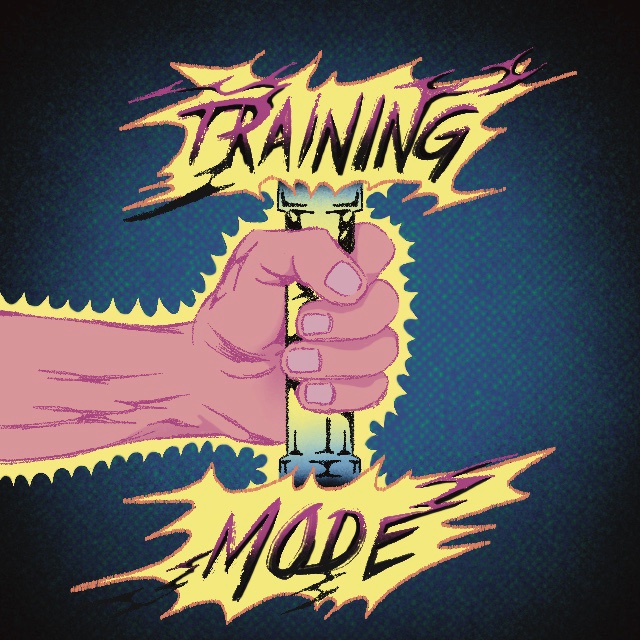It feels counterintuitive that an action-packed game such as Skyrim is able to create such stillness in my mind.
I’ve played the fifth Elder Scrolls game on repeat since it was released in 2011. I’ve tackled dungeons, battled dragons, and been accused of having my sweet roll stolen more times than I count. However, the more I revisit it, the more I discover that I simply want to take everything… slower.
When playing in this mindful state, I forgo fast travel and hit the ground on foot, letting the scenery guide me to a place so stunning that I can’t help but stop and take in the moment. If I’m lucky, I’ll catch a glimpse of the northern lights, and I’ll stay and watch an ocean of colors dance across the digital sky.

Have you ever thought to yourself, I want to get better at games, but I don’t want to destroy my life? We’re here to help with a special week dedicated to all things video games and health.
Seeking these places out is its own reward, particularly after long, hard battles or epic quests. For instance, climbing my way up to High Hrothgar, battling the 7,000 steps, and grappling with a frost troll along the way. The struggle is worth the serenity found at the top of the Throat of the World, with the icy wind blustering in my ears over the stirring soundtrack.
The game even has moments that specifically encourage players to embrace a gentle pace. When I first discovered Eldergleam Sanctuary, it was purely by accident. I snuck in, dual-wielding swords, poised at the ready for whatever enemy was sure to come around the corner.
Imagine my surprise when I was met with two followers of the goddess Kynareth, who simply spent their time taking in the beautiful sights of the rushing waterfalls, overgrown roots, rocky caverns, and sprawling branches of a central ancient tree. I was brought to a stop, spellbound at the sight before me.
Meditation within gaming is often associated with a “flow state,” which psychologists theorize can be achieved with titles like Tetris, where a user is focused on one sole activity. There are tasks within Skyrim that could be associated with this style of play; cooking, smithing, and alchemy are all simple and repetitive enough. However, the immersion of an RPG and its tranquil environments elevates this concept to a different level of mindfulness for me.
To explore this idea, I reached out to Thomas McConkie, the founder of Lower Lights School of Wisdom currently studying transformative practice at Harvard University. He hosts the Mindfulness Plus podcast, where he explores topics such as using technology to deepen and express mindful awareness.
He believes that role-playing as another character within a game like Skyrim is in fact an extremely effective tool for meditation, especially if we spend a lot of time dwelling on our own existence as we go through day-to-day life.
“We know from Buddhism (and personal experience) that excessive self-reference and self-clinging make us unhappy,” he wrote via email. “In response, Buddhists developed a practice in the Tibetan tradition known as Deity Yoga.
“It’s a sophisticated tradition, more than I can sum up all at once here, but the transformative element consists in learning to decentrate our sense of self. That is, by putting all of our mindful awareness into another being, we gain insight into the arbitrary nature of identification in the first place.”
As such, he believes that it doesn’t matter if you’re role-playing as a Nord Stormcloak rebel or a Khajiit thief. Providing you are finding your zen within the game, there is a chance that you are still playing as yourself.
There are other open-world games that can provide these opportunities to rest and soak in the atmosphere, such as The Legend of Zelda: Breath of the Wild or The Witcher 3: Wild Hunt. However, this Bethesda classic has the strongest hold on me, and I can’t help but wonder how much nostalgia plays a part in this.
When Skyrim was released, I was going through a very disruptive and difficult period in my personal life. It was my escape, a chance to go adventuring in a harsh, fantastical wilderness. Now every time I load up a save file, it feels like coming home — I can find a new place that I haven’t discovered yet and go back to that state of simply being (providing a sabre cat doesn’t drop in for a surprise visit).
For me, that familiar feeling is enhanced by the haunting score and Nordic scenery. When I asked McConkie about this, he agreed that visual and audio elements can be one effective tool for meditation, providing that they help you concentrate on the present moment. What’s more, you can enhance these moments throughout your day-to-day life.
“To boost your mindfulness experience with Skyrim, or any game or activity, you can practice keeping some attention on physical sensation and emotion at all times, and having an attitude of openness and willingness to feel everything you’re feeling,” he wrote. Furthermore, he claimed that this can lead to the “mindfulness skill of equanimity,” which in its simplest form means to accept situations for what they are, even if they are difficult.
The next time you play Skyrim, I encourage you to find a quiet place of your own, take a moment, and embrace being aware. Being present in the moment is its own state of comfort, even if it’s in a virtual, dragon-filled world.
